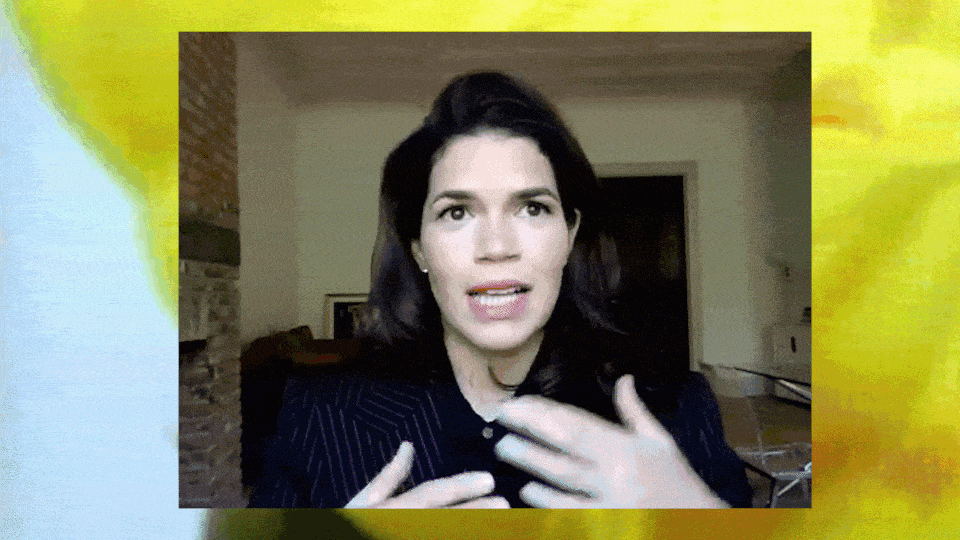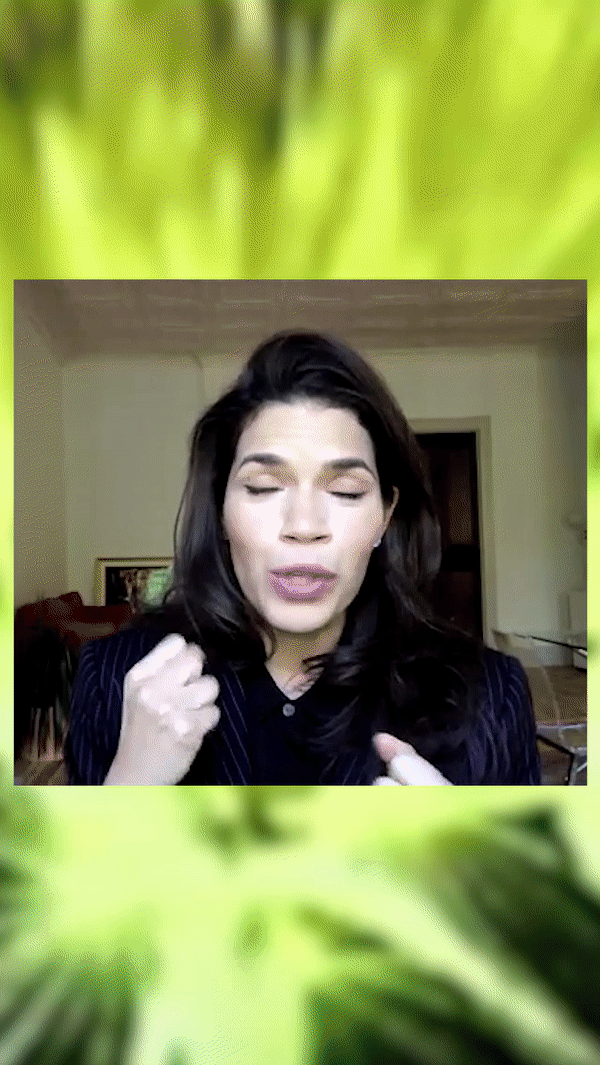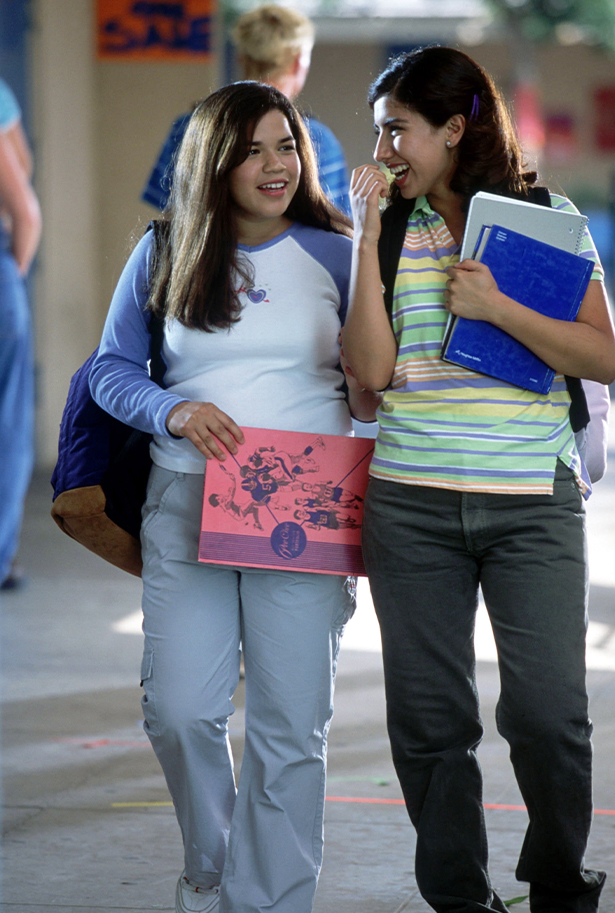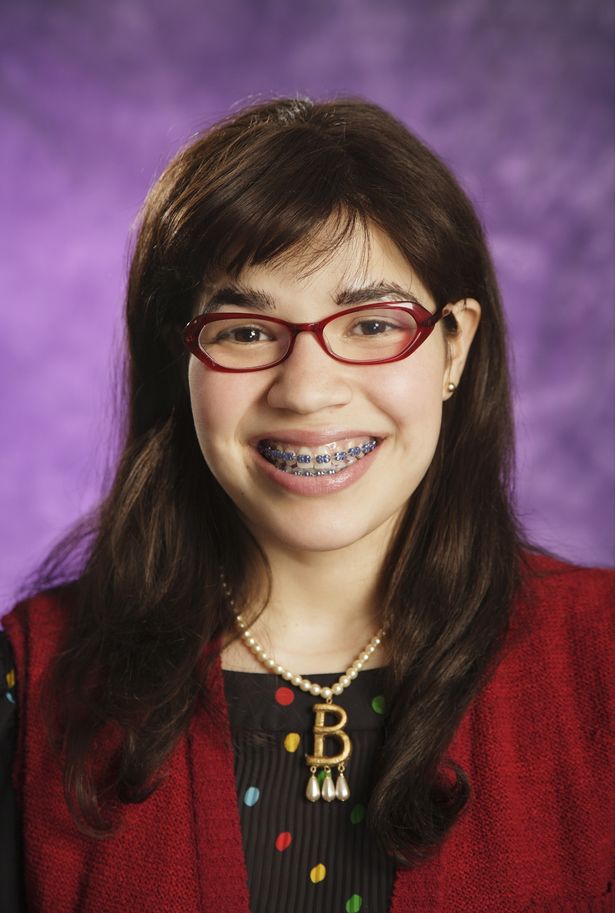On Twenty Years in Hollywood and Creating Stories by Latinos for Latinos
America Ferrera has catapulted herself to mainstream success by making the most ordinary characters seem all but ordinary. She has played the roles of teenage girl on the cusp of college-age adulthood, big-box store employee, and overworked assistant, to name just a few, and given them on-screen complexity that reaches deeper than their superficial descriptions. In turn, a generation of Latinas have grown up alongside her, including myself. Still, upon meeting her, I was struck by her unique movie-star-meets-older-sister disposition. She is undeniably well known, with a household name and familiar face. And she is disarmingly percipient, with a persuasive smile and introspective demeanor.
When I met Ferrera in mid-November, she zoomed in from New York City. We spoke during a round of press junkets for the second season of Netflix’s hit Dramedy, “Gentefied,” a series for which she was executive producer and director of several episodes. Her day was jam-packed with interviews and A-list appearances. During our conversation, she reflected on her glass-ceiling breaking moments and what it’s like to be a role model to countless individuals, including those she’ll never meet and those she works alongside on a daily basis.
This past spring, Ferrera reached an uncommon milestone for an actor in their late 30s: she celebrated 20 years of continuous work in the entertainment industry. As an actor, she is secure, efficient, and focused. She has leaned into her hard-earned comforts, telling me: “I have more fun now than I ever have.”
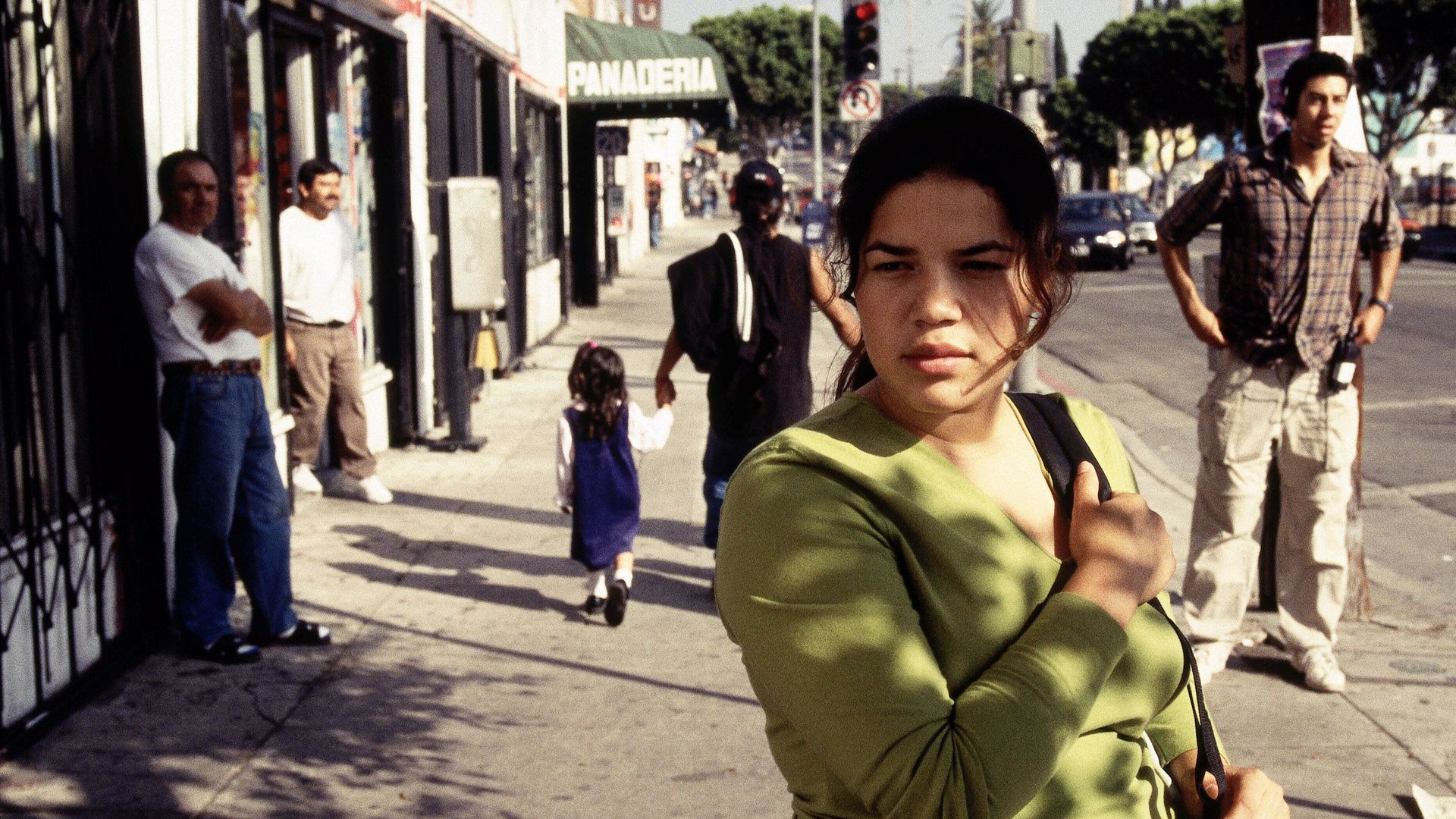
In ’02, America Ferrera starred in “Real Women Have Curves.” She played Ana García, an 18-year-old East L.A. native aspiring to attend college while simultaneously clashing with her Mexican-American mother’s expectations. Photography courtesy of HBO Studios/LaVoo Productions.
As we continued our discussion, she spoke candidly about the stress she faced as a young striving actor, battling fears of illegitimacy and assuming one opportunity might not lead to the next. But over two decades, she has weathered industry pressure and settled into the security of her late thirties. “At this age, I’m not interested in running myself into the ground, which is what I often did in the past. Because when you never know where the next job is coming from, or when it’s coming, you say yes to everything. You’re afraid to say no, and you’re afraid to take care of yourself.”
Acting has been Ferrera’s lifelong passion. She describes it as a craft that makes her feel electric and alive, as if she is firing on all cylinders. Ferrera posits that a gradual but seismic shift over the past 20 years allowed her to move away from measuring her worth against others’ expectations. “When you walk into a room, and your goal is to prove that you belong or that the people who have hired you are not going to be disappointed, it’s very, very hard to be creative and bring the best of you,” said Ferrera. Yes, some of this confidence comes with age, but she also underlines her conscious intention to stay out of her own way.
- In ’02, Ferrera got her big break in Disney’s “Gotta Kick It Up!” She played Yolanda “Yoli” Vargas, a lively member of a dance team comprised of Latina middle schoolers.
- From ’06–’10, the actress starred in “Ugly Betty.” She played Betty Suarez, a smart and savvy assistant who is a misfit among her fashionista colleagues.
When I asked her about the medley of roles she has embodied and why these characters resonated with her audiences, Ferrera turned the question around. “Well, I have my guesses, but what I can speak to is why they resonated with me,” she said. Fortuitously, she has had the opportunity to create characters that she felt she had never seen represented through a Latino lens. Ferrera expanded on this point, “I had never seen these versions of a woman like me. I fell in love with each of them because they were complex, human, and they were outside of the stereotype.” The actress has taken on shape-shifting roles that allowed her to build out a diverse career. But for Ferrera, shape-shifting was a necessary skill that she picked up early in her youth.
The Los Angeles-born actress is the youngest of six children raised by her Honduran immigrant parents in Woodland Hills. In the foreword to her 2018 compilation of essays, “American Like Me: Reflections on Life Between Cultures,” Ferrera details early experiences being labeled as a “whitewashed gringa” in Latino groups and categorized as “rare” and “exotic” by her white friends. Despite the struggle of this cultural hybridity, Ferrera demonstrates how her early experiences only further fueled her determination to become an actress. On her path to realizing her dream, she faced criticism and doubt from all directions, including her family. Ferrera writes, “Family members would say to me bluntly, the way families are prone to do, ‘Actresses don’t look like you. You’re brown, short, and chubby.’”
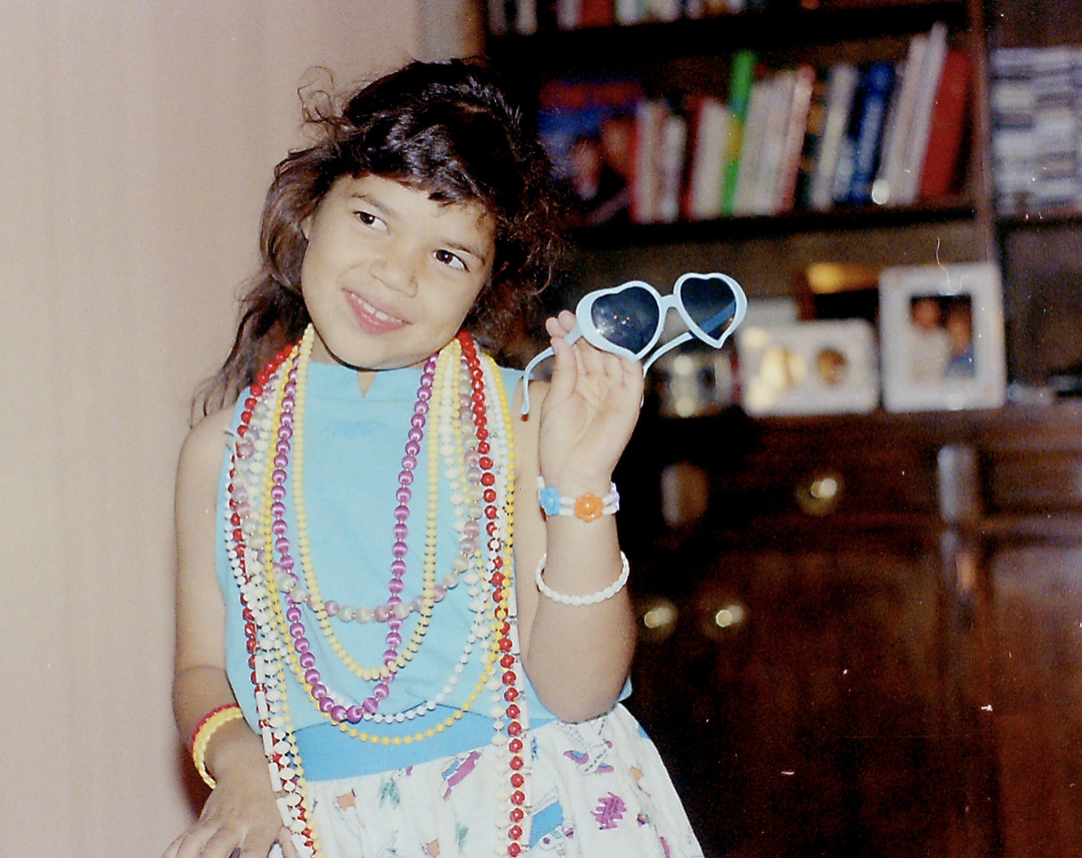
Young America Ferrera. Photograph originally published in “American Like Me: Reflections on Life Between Cultures” (2018).
When she became a working member of the entertainment industry, she faced the same battle but with even more insidious and stifling dynamics. As she writes in the book, “Somehow the boxes I resisted being shoved into during my childhood were even tighter and more suffocating in Hollywood. The first audition I ever went on, the casting director asked me if I could ‘try to sound more Latina.’” After she booked her first two major roles, Yolanda in “Gotta Kick it Up!” (2002) and Ana in “Real Women Have Curves” (2002), Ferrera focused on securing characters that were well-written and relatable. She recounts how when she requested that her former manager send over roles that fit this bill, he had responded, “Someone needs to tell that girl that she has unrealistic expectations of what she can accomplish in this industry.”
To this very day the actress is astonished by her unlikely career. “When you look at the actual data and the facts and the numbers of how many Latinx people get to have and build a long career in this industry, it’s quite a miracle. And then when you add in what way we’re allowed to build and sustain a career in this industry, it’s often by playing into the most common stereotypes of who we are.”
In 2007, Ferrera was the first Latina to win an Emmy in a lead actress category. Hollywood lifts up accomplishments such as Ferrera’s in ’07 with exaggerated pageantry. These unprecedented moments are exalted to affirm communities of strivers to believe that they too can reach such milestones. Reflecting on this pivotal moment, Ferrera laments, “I can’t help but just look back and think that it didn’t change very much. I take no joy knowing that’s how long it took for someone like me to be acknowledged and that not much has changed. When we have these moments of cultural presence, where all of a sudden something breaks through — a story, a character, a creative person — I hope those moments create a watershed.” But in Hollywood, that is rarely the case.
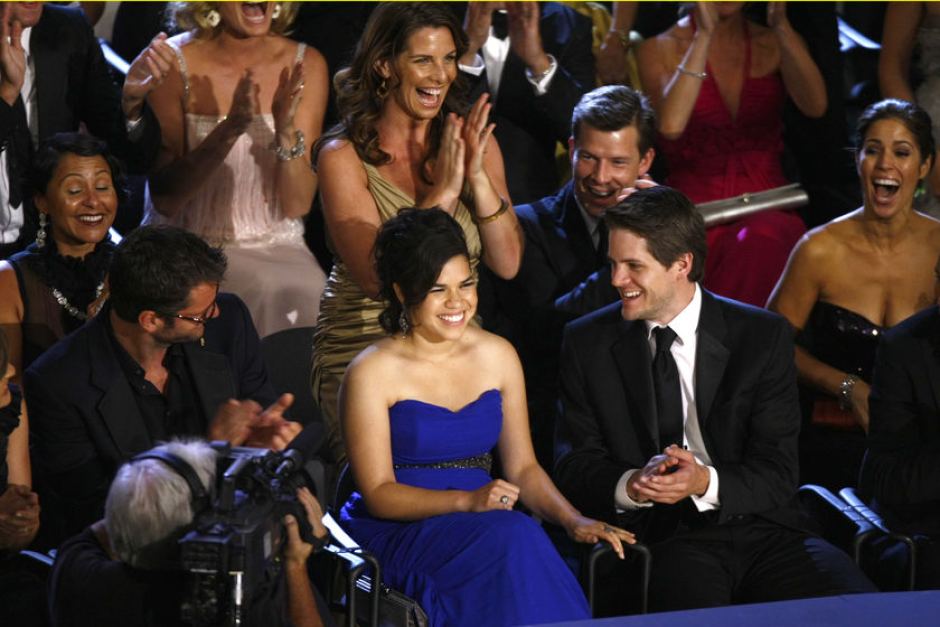
America Ferrera, her husband Ryan Piers Williams, and the cast of “Ugly Betty” in ’07 reacting to Ferrera’s Outstanding Lead Actress In A Comedy Series win. Photography by Mike Blake/Reuters.
For example, in 2002, “Real Women Have Curves” was critically praised and commercially successful. One would expect the film to lay a viable pillar for other Latino industry talent to build future critical and commercial success. But that’s not what happened in 2002. That’s not what happened in 2007, either, after “Ugly Betty” was a massive hit and Ferrera took home an Emmy. Neither moment created an onslaught of network shows empowering Latino creatives and Latino stories. Ferrera opined, “We were viewed in many of those instances as an exception versus proof that there is talent.”
In 2006, Ferrera founded her television and film production company, Take Fountain, and branched out into an activist mantle behind the scenes. At the time, her modus operandi had transformed: she became intent on expanding representation, hiring fellow Latinos, allowing her community the opportunity to fully express their talent, and advocating for other Latino creators to succeed. In Hollywood, producers act as gatekeepers and grant access and opportunity based on their position. Given her experiences in the industry, Ferrera was a natural fit to assume the role. After her Emmy win, she nabbed her first two production credits. First as an executive producer on a short directed by her husband Ryan Piers Williams titled “Muertas” (2007) and then as an executive producer/lead actress for the crime thriller “Towards Darkness” (2007). Next came a lead role/EP credit in the Iraqi veteran coming home flick “The Dry Land” (2010) and a millennial New York centric film “X/Y” (2014). Both films were directed by Piers Williams and starred Ferrera. Reflecting on her behind-the-scenes pivot, Ferrera admitted, “I was acting and very, very busy. I didn’t need another job, but I realized that I could get into certain rooms. People were interested in the stories I wanted to tell. The longer my career went on, the more I had the power and ability to turn people’s attention towards certain stories and certain creators.”

America Ferrera and Linda Yvette Chávez on the set of “Gentefied.” Photograph courtesy of Netflix.
Ferrera’s most well-known production credit thus far is Netflix’s bilingual dramedy “Gentefied” (2020-present). The series follows a Mexican-American family in Boyle Heights, CA, who are scrambling to save their grandfather’s taco shop and pushing back against gentrification in their ‘hood. The Netflix series is a television adaptation of the “Gente-fied” web series created by Marvin Lemus and Linda Yvette Chávez in 2016, two creatives that had never before sold a TV script or set foot in a writer’s room. Before the web series went into production, the duo had a chance to meet with Ferrera, who immediately signed on as an executive producer. The digital series was picked up by Netflix shortly after premiering at the Sundance Film Festival in 2017.
“Gentefied” coalesces Ferrera’s behind-the-scenes strengths and her high-level impetus to lift up remarkable Latino storytellers. She is the persuasive ally for talents like Lemus and Chavez, aiding in all steps from development to post-production to the promotional rollout. She is, after all, experienced in weathering the challenges of Hollywood. “I think people may only have an inkling of — but don’t understand — just how difficult it is to get a show by Latinx talent, made with Latinx talent in every key position, and to get it out into the world. In this current system, it’s a tough feat,” underscored Ferrera. Making TV is hard, period. Making Latino TV by Latinos for Latinos is nearly impossible.
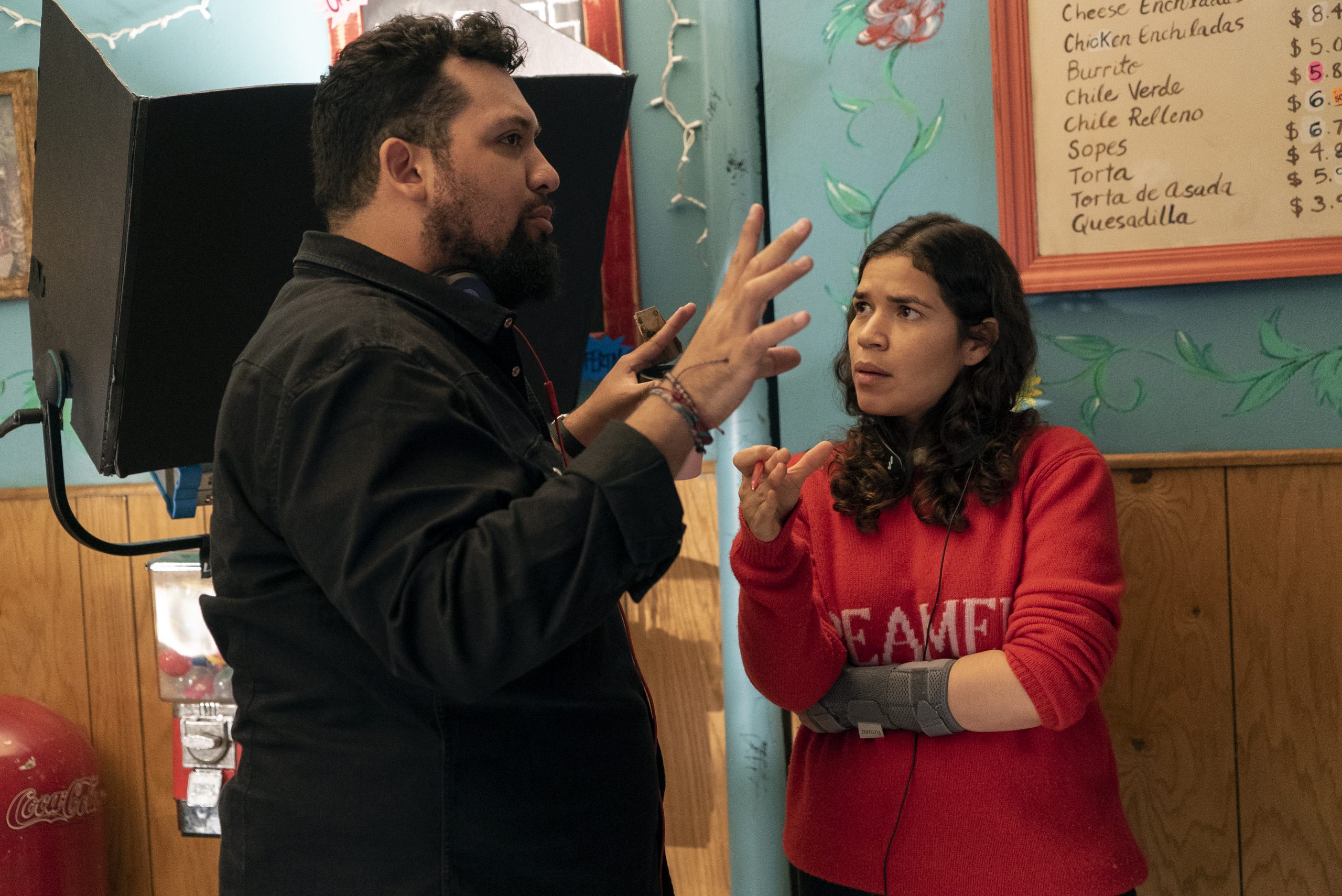
America Ferrera and Marvin Lemus on the set of “Gentefied.” Photograph courtesy of Netflix.
During our conversation, Ferrera pointed out that shows like “Gentefied,” “Vida” (2018-2020), or “One Day at a Time” (2017-2020) — by Latinos for Latinos — are, in fact, miracles. She knows this from the outside looking in and maintains a collaborative relationship with the creative forces behind the shows. This past fall, Tanya Saracho (of “Vida”), Gloria Calderón Kellett (of “One Day at a Time”), and Ferrera announced the launch of their DEAR Hollywood project: a vehicle for advocacy and access within the realm of Latino representation. This venture’s core is five pillars that read as a timely manifesto. The project aggregates decades of their hard-earned professional gains and a crescendo of mounting frustration with the entertainment industry’s storytelling status quo. As Ferrera summed up, “The truth about making change and the difference between a successful and unsuccessful creative process comes down to real benign minutia.” She’s right. The sum of the boring stuff, like who’s in the room, who’s on the phone call, or who gets worn down first, drives a series’ creative potential. Ferrera sums these unspoken power dynamics up as a “battle of attrition.” She added, “How much power do we have to defend the version of the story? And then ultimately, who’s in our corner? Who are our allies?” Ultimately, these etiquette traditions and unspoken rules dictate how stories are told and developed. Ferrera and her generation of Latino creative movers and shakers intend to remake the game.
Looking towards the next two decades, Ferrera is firmly intent on making art that appeals to her as a Latina, and to her many other identities: mother, daughter, west-coast native, millennial, NYC transplant, and so on. She hopes that the industry will hold opportunity and space for Latinos to present their whole identity without the responsibility of representing a monolith. Ferrera hopes Latino artists, storytellers, creatives, and craftsmen will be seen in their fullness. She wants to believe that in 20 years, Latinos will no longer need to fight for the most basic level of representation. As for where the multi-hyphenate wants to see herself in the next two decades, she is not interested in predicting where her career will turn. Instead, she spoke about turning inward, to focus on continuing to cultivate self-assurance: “In 20 years, I want to feel more in my body, more joy, more comfort with all the things that I am. More able to walk into any room exactly as I am, and to feel true ownership of myself and my power, with no apology.”
